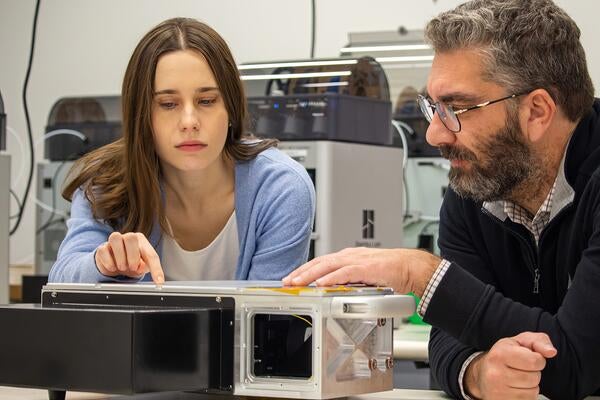
Desk chair of the future blends real and virtual worlds
Furniture responds to movements, recommends breaks

Furniture responds to movements, recommends breaks
By Media RelationsComputer science researchers at the University of Waterloo have created a smart desk chair that can intuitively respond to the user’s movements, such as projecting important information on an office wall when the user swivels away from their desk or suggesting regular breaks for mental and physical health.
The project is part of research into spatial augmented reality— technology that merges the real and virtual worlds by superimposing computer-generated content onto surfaces using one or more digital projectors.
“Say you’re leaning forward in your office chair,” said Nikhita Joshi, a PhD candidate in the Cheriton School of Computer Science at Waterloo and the lead researcher on the project. “Leaning forward suggests you’re engaged in a task or meeting with a co-worker. A spatial augmented reality system could detect your sitting posture and the location of the chair in the office, then use these inputs to project on the wall zoomed-in digital content you’re discussing with a co-worker. ”
The desk chair prototype includes sensors on the seat, back, and arms, a camera to track the chair’s position, a moving projector to display data onto surface, and a miniature built-in computer to process all the information.
The technology can do a lot to make office work more efficient and intuitive. It could display notifications and alerts, project grids or diagrams onto whiteboards during brainstorming sessions, or even encourage the user to do a deep-breathing exercise when it senses them leaning back for a physical break from their monitor.
A spatial augmented reality chair could also be useful in other situations, said Daniel Vogel, professor of computer science at Waterloo. “A doctor’s chair could be instrumented to project a patient’s medical records or the results from diagnostic tests on the wall when the physician makes certain movements in the chair.”
A paper detailing the research was recently published and won the Best Paper award at the 2022 ACM Spatial User Interaction Symposium.

A car’s exhaust pipe emits black carbon. This sooty form of pollution alters the “light environment” beneath the snow, affecting plant growth. (Kmatija/Getty Images)
Read more
Research into light and snow interactions provides new insights into how pollution can affect vegetation growth and impact ecosystems

Read more
Researchers developed a process to reduce the amount of energy needed to run data centres

Read more
Phantom Photonics’ quantum remote sensing technology offers precision for industries operating in extreme environments
The University of Waterloo acknowledges that much of our work takes place on the traditional territory of the Neutral, Anishinaabeg, and Haudenosaunee peoples. Our main campus is situated on the Haldimand Tract, the land granted to the Six Nations that includes six miles on each side of the Grand River. Our active work toward reconciliation takes place across our campuses through research, learning, teaching, and community building, and is co-ordinated within the Office of Indigenous Relations.